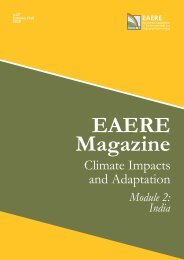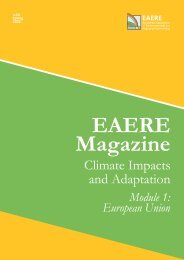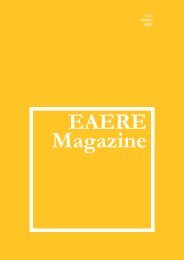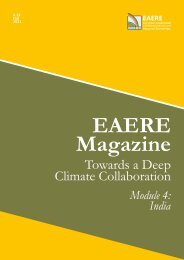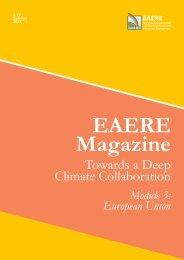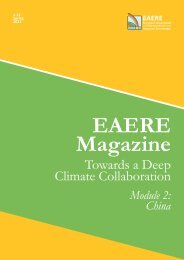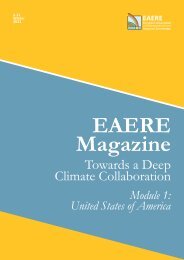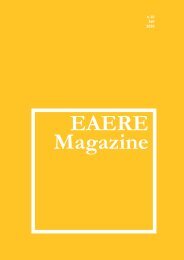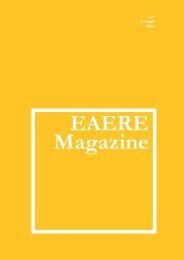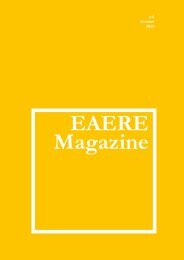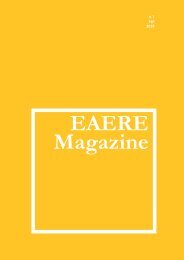EAERE Magazine - n.8 Winter 2020
You also want an ePaper? Increase the reach of your titles
YUMPU automatically turns print PDFs into web optimized ePapers that Google loves.
The rapid coming of age of<br />
<strong>EAERE</strong> 1<br />
Henk Folmer<br />
University of Groningen, The Netherlands<br />
Henk Folmer is professor of regional economics at the University<br />
of Groningen, The Netherlands and of general and environmental<br />
economics and econometrics at the North West Agricultural and<br />
Forestry University, Yangling, China. He is editor of The International<br />
Review of Environmental and Resource Economics and Letters in<br />
Spatial and Resource Sciences. He serves on the editorial board of<br />
various journals on environmental and regional economics including<br />
Environmental and Resource Economics, The Annals of Regional<br />
Science and The Journal of Regional Science. He has supervised 40 PhD<br />
students from developed but especially from developing countries.<br />
He holds an honorary doctorate from the University of Gothenburg,<br />
is fellow of <strong>EAERE</strong> and the Regional Science Association International,<br />
Renowned Overseas Scholar, China Ministry of Education and<br />
Outstanding Foreign Expert, Shaanxi Province, China.<br />
The prehistory<br />
<strong>EAERE</strong> had an unexpected, unintended and<br />
somewhat messy start. The association’s very<br />
beginning dates back to 1987 when I, as a<br />
newly appointed professor of general economics<br />
at the University of Wageningen,<br />
The Netherlands, was asked by the rector<br />
to also “pay attention to environmental and<br />
resource problems”. I was not really familiar<br />
with the topic but had become interested at<br />
a regional science meeting at the University<br />
of Umea, Sweden, where I had run into<br />
Karl-Gustaf Löfgren, Karl-Göran Mäler and<br />
Horst Siebert who showed great enthusiasm<br />
about environmental and resource economics.<br />
I was impressed by their presentations<br />
and picked up some basic concepts and theories.<br />
To follow up on the rector’s request, I<br />
decided to familiarize myself with the field<br />
by organizing a conference in Wageningen<br />
rather than studying textbooks and papers.<br />
From the program of the Umea conference,<br />
I picked up topics and, especially, names of<br />
people who had given presentations for large<br />
audiences. To my surprise, virtually all of the<br />
addressees were interested in coming to Wageningen.<br />
Moreover, they provided me with<br />
names of other potential participants. The<br />
conference was a great success and I learned<br />
a lot. At one of the dinners with keynote<br />
speakers, I asked around if it might be<br />
useful to have something like a “European<br />
Association of Environmental and Resource<br />
Economists”. The answers to my question<br />
were unanimously positive but I had to pay<br />
a price: the dinner guests told me that it was<br />
me to get the association started. As a sticking<br />
plaster, they appointed me president.<br />
The first things for me to do were to form<br />
a provisional board, to recruit members, to<br />
get some financial support and to organize<br />
the next conference. These tasks were not<br />
too complicated. Horst Siebert, Karl-Göran<br />
Mäler and David Pearce were happy to join<br />
the provisional board. Recruiting members<br />
was also quite easy. Virtually all the participants<br />
of the Wageningen Conference and<br />
the environmental economists of the Umea<br />
Conference signed up. In addition, the word<br />
about the new association spread quickly<br />
around in Europe and the USA and within<br />
no time there were more than a hundred<br />
members. Another stimulus to join <strong>EAERE</strong><br />
was the launch by Kluwer Publishers, now<br />
Springer, of a new journal, Environmental<br />
and Resource Economics. The journal was run<br />
in close cooperation with the association’s<br />
provisional board and was made available<br />
to <strong>EAERE</strong> members at a reduced price.<br />
The organization of the next meeting was<br />
facilitated by the fact that I served on the<br />
EU Task Force on the Environment and<br />
the Single European Market where I used<br />
to meet Frank Convery who was well connected<br />
with many officials of the European<br />
Commission, especially Jos Delbeke at<br />
the Directorate-General for the Environment.<br />
Jos was willing to support the next<br />
conference financially. Frank’s extensive<br />
network also included people at the Fondazione<br />
Enrico Mattei who were interested<br />
in hosting the next meeting in Venice. The<br />
conference, with Ignazio Musu in charge of<br />
the local organization, was a great success in<br />
every possible respect: scientifically, socially,<br />
culturally and gastronomically. In addition, it<br />
was very relaxed because the presentations<br />
9<br />
9



